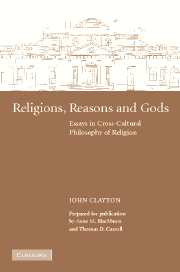Book contents
- Frontmatter
- Contents
- Editorial preface
- Acknowledgments
- List of abbreviations
- 1 Claims, contexts and contestability
- PART I REASON AND RELIGIOUS PLURALISM
- PART II THEISTIC ARGUMENTS IN PRE-MODERN CONTEXTS
- PART III THEISTIC ARGUMENTS IN EARLY-MODERN CONTEXTS
- Appendix: The 1997 Hulsean Sermon
- Bibliography
- Index
PART II - THEISTIC ARGUMENTS IN PRE-MODERN CONTEXTS
Published online by Cambridge University Press: 22 September 2009
- Frontmatter
- Contents
- Editorial preface
- Acknowledgments
- List of abbreviations
- 1 Claims, contexts and contestability
- PART I REASON AND RELIGIOUS PLURALISM
- PART II THEISTIC ARGUMENTS IN PRE-MODERN CONTEXTS
- PART III THEISTIC ARGUMENTS IN EARLY-MODERN CONTEXTS
- Appendix: The 1997 Hulsean Sermon
- Bibliography
- Index
Summary
Part II offers three exploratory demonstrations of how comparative philosophy of religion might proceed, if oriented by the study of theistic arguments as embedded in religious forms of life. In these chapters Clayton discusses the degrees and kinds of difference that become visible through such comparative historical projects. He also provides examples of pre-modern theistic argument in relation to which the distinctive character of modern uses of such argument might be measured. Chapter 5, ‘Ramanuja, Hume and “Comparative Philosophy”: Remarks on the Sribhasya and the Dialogues concerning Natural Religion’, develops a comparison of Hume and Ramanuja by analysing their theistic arguments with respect to the interpretative communities to which they belonged. Differentiation between the grounds, motives and ends of argument for Ramanuja and Hume provides the philosophical structure through which Clayton historicizes instances of rationality.
Chapter 6, ‘Piety and the Proofs’, continues Clayton's attention to the operations of theistic argument within specific religious traditions and communities, here described as forms of life. In this chapter we see an intensification of interest in the genres within which theistic proofs occur, and the audiences for such genres, topics which receive yet more explicit treatment in Chapter 7, ‘The Otherness of Anselm’, and in Part III. All of the essays in Part II (Chapters 6 and 7 most explicitly) approach the comparative philosophical study of theistic proofs by analysing them within contexts of composition and reception. On Clayton's view, without such contextual analysis one risks making mistaken philosophical claims.
- Type
- Chapter
- Information
- Religions, Reasons and GodsEssays in Cross-cultural Philosophy of Religion, pp. 99 - 100Publisher: Cambridge University PressPrint publication year: 2006



